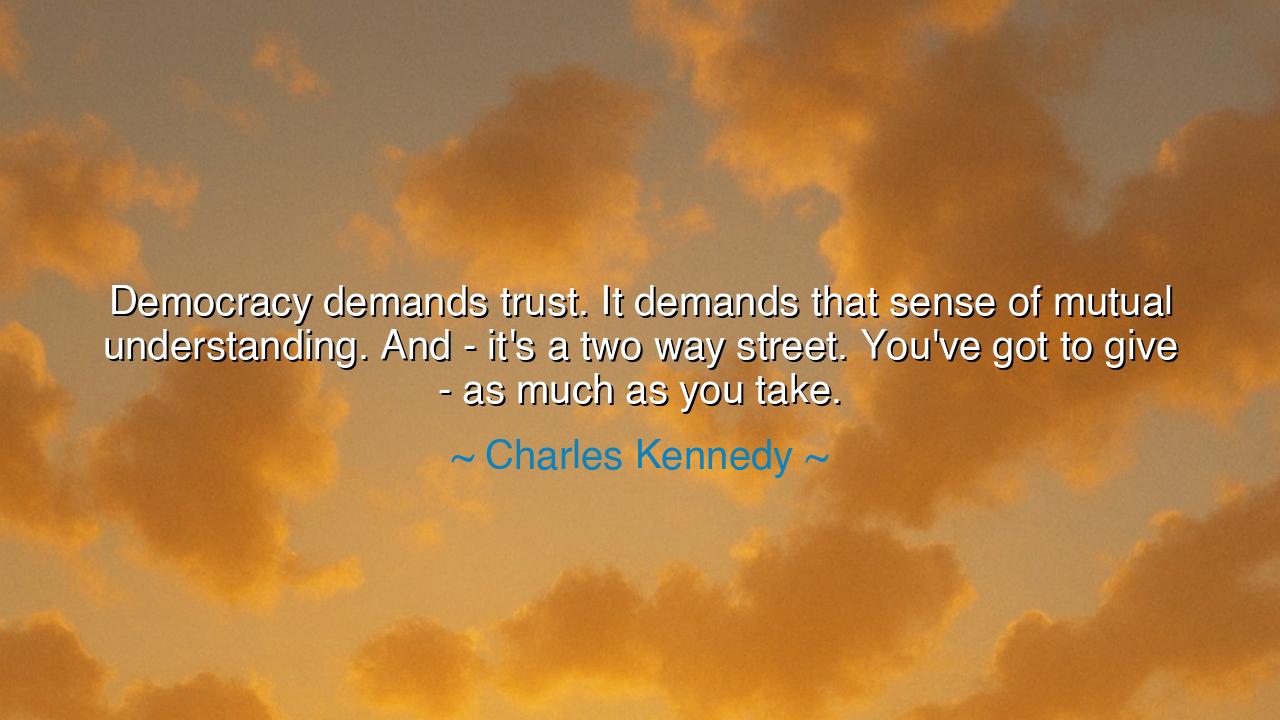
Democracy demands trust. It demands that sense of mutual
Democracy demands trust. It demands that sense of mutual understanding. And - it's a two way street. You've got to give - as much as you take.






In the words of Charles Kennedy, leader, orator, and servant of the public, we hear a truth as ancient as the gathering of tribes beneath a common fire: “Democracy demands trust. It demands that sense of mutual understanding. And—it’s a two-way street. You’ve got to give—as much as you take.” These words speak not merely of government, but of the very covenant that binds people to one another. They remind us that democracy is not sustained by laws and structures alone, but by the invisible thread of trust and the sacred balance of giving and receiving.
The ancients knew this well, though they spoke in different tongues. In the city of Athens, men gathered in the agora to speak and to listen, bound not by fear of a king but by their mutual recognition of shared responsibility. Their system was imperfect and limited, but the principle was eternal: understanding must dwell among citizens, or the house of democracy would collapse into tyranny. Kennedy’s words echo this wisdom: that trust between ruler and ruled, between neighbor and neighbor, is the lifeblood without which freedom withers.
When he says it is a two-way street, Kennedy calls us to humility. For too often men demand the fruits of liberty but are unwilling to bear its burdens. They ask for justice, but will not themselves act justly. They call for honesty from leaders, yet betray their own word in private dealings. True democracy cannot live where each takes and none gives. It requires sacrifice, patience, and goodwill from all who partake in it. The ancients likened this to the harmony of a lyre: each string must yield its part, or the whole instrument falls into discord.
History gives us powerful testimony. Consider the tale of the American Civil Rights Movement. Citizens who were long denied their rightful share of democracy rose not with violence, but with steadfast courage. Their marches, sit-ins, and words demanded that the nation honor its promise of equality. Yet even as they demanded, they gave—faith, discipline, and dignity. They trusted in the power of justice, even when beaten and jailed. Through this sacred exchange of sacrifice and trust, democracy in America grew stronger. Their story shows us that democracy lives only when people both give and take, both demand and contribute.
The heart of Kennedy’s teaching is that mutual understanding must reign above suspicion and division. Without understanding, trust crumbles. Without trust, democracy dissolves into factions, where each seeks only its own gain. He warns us that to live in freedom requires us to see beyond ourselves, to hear the voices of others, and to honor the invisible bond that ties us all. Like a bridge, democracy requires weight to be carried from both ends. If one side refuses, the structure collapses, and the river of discord swallows it whole.
The lesson, then, is clear: practice trust, understanding, and generosity in both civic and personal life. Do not take without giving—give your honesty, your respect, your participation, your patience. Vote, but also listen. Speak, but also allow others to speak. Demand fairness, but also live fairly. Only then will democracy flourish not as an empty word, but as a living covenant.
So I say to you, children of tomorrow: cherish the gift of democracy, for it is fragile and must be tended like a flame. Guard it not only with laws, but with the daily practice of trust. Give as freely as you take, seek to understand as deeply as you wish to be understood, and uphold the bond of mutual care. For if you do so, you will walk the two-way street as Kennedy counseled, and the house of freedom will stand firm through the ages.






BNlai tran bao nhi
It’s powerful how Kennedy frames democracy as a two-way street. But does the concept of trust apply equally across all levels of democracy? For instance, can ordinary citizens feel the same trust in their leaders as leaders do with the people? Is this mutual understanding even possible when people’s experiences with government are often shaped by distrust, corruption, or inefficiency? How do we rebuild trust in such a system?
GDGold D.dragon
Kennedy’s point that democracy demands mutual understanding is so true, but can that ever be achieved when people have such differing views on fundamental issues? Is there a way for both citizens and politicians to truly listen to one another without letting personal biases get in the way? How do we break through the barriers that prevent us from fully embracing the 'give and take' that democracy requires?
AAmanda
I love that Kennedy emphasizes democracy as a two-way street, but it raises an important question—how do we encourage people to genuinely 'give' as much as they take in today’s political climate? So much of modern discourse seems driven by self-interest, where compromise is seen as weakness. How do we restore the sense of shared responsibility and mutual trust when there’s such a lack of willingness to meet halfway?
PLUyen phuong Le
Charles Kennedy’s quote speaks to a fundamental aspect of democracy: trust. But how do we build and maintain that trust in a polarized world where people seem to be more divided than ever? How can leaders and citizens alike ensure that mutual understanding is prioritized over personal or partisan interests? Is it enough to give and take in theory, or does it require a deeper commitment to shared values and empathy?